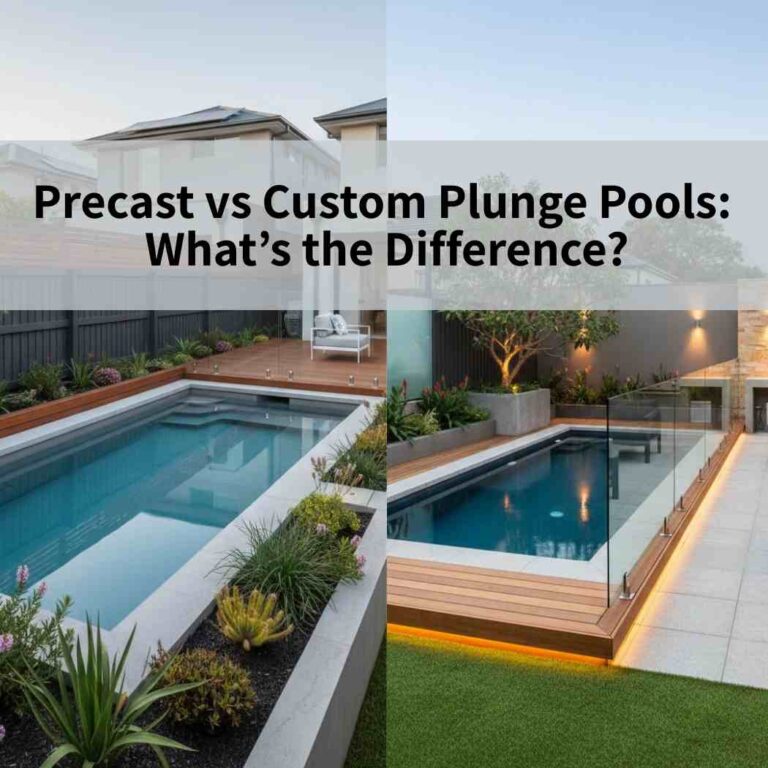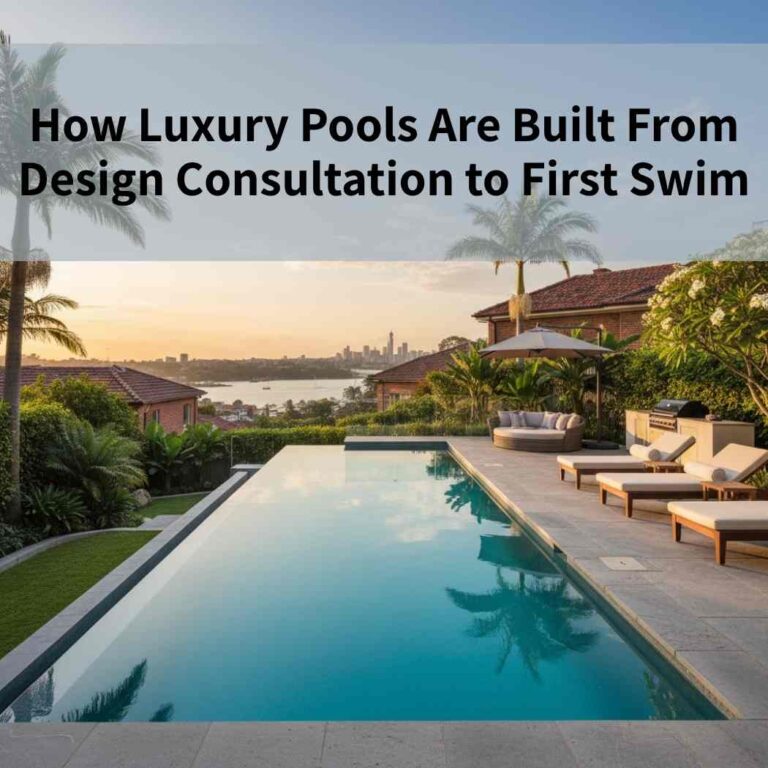Plunge Pools Sydney is a trusted provider known for tailored installation and expert guidance, helping homeowners achieve the right fit for their space and lifestyle.
In this article, we explain the core benefits of plunge pools, outline installation steps and costs, and help you determine whether one suits your home.
Table of Contents
ToggleWhat is a plunge pool?
A plunge pool is a small, deep pool designed for lounging, cooling off, and hydrotherapy. Typically measuring between 2 to 7 meters in length and 2 to 4 meters in width, with depths ranging from 1.2 to 2 meters, they are perfect for limited spaces. Features may include built-in seating, heating options, and hydrotherapy jets.
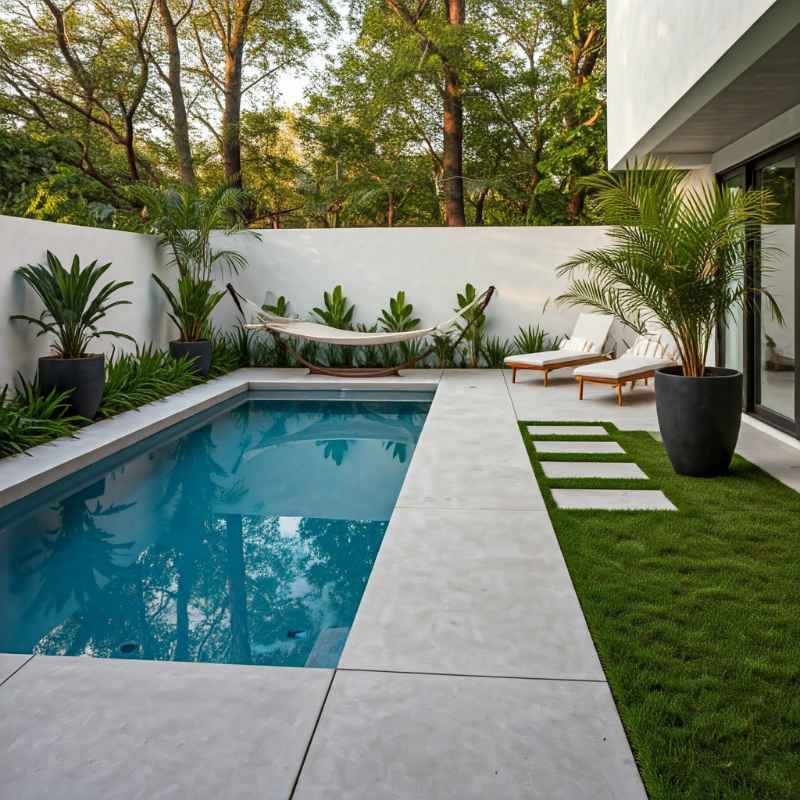
Why are plunge pools so popular in Australia?
Plunge pools have surged in popularity across Australia for several compelling reasons:
Climate Compatibility: Australia’s warm climate makes plunge pools a refreshing retreat.
Space Efficiency: Ideal for urban homes with limited backyard space.
Cost-Effectiveness: More affordable to install and maintain than traditional pools.
Aesthetic Appeal: Enhances outdoor living spaces with modern designs.
Versatility: Suitable for relaxation, light exercise, and hydrotherapy.
Health Benefits of Plunge Pools
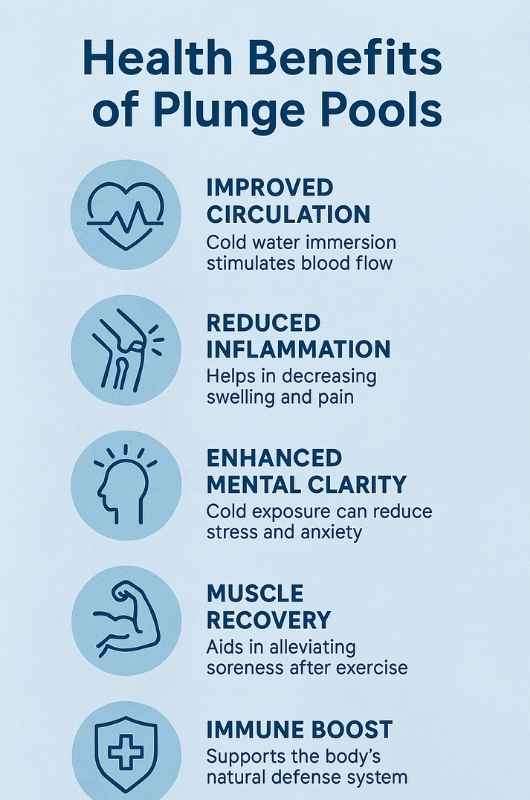
Owning a plunge pool offers several advantages that go beyond a simple cooling-off spot.
1. Circulatory and Inflammatory Response: Plunge pools, when used for cold water immersion, stimulate blood circulation and reduce inflammation by constricting blood vessels and then promoting vasodilation during recovery. This process enhances thermoregulation and supports faster muscle recovery after physical exertion.
2. Mental Clarity and Stress Relief: Cold immersion activates the vagus nerve, which helps regulate the nervous system and improve heart rate variability (HRV)—a key marker of stress resilience. The result is enhanced mental clarity, better emotional balance, and reduced anxiety.
3. Muscle Relaxation and Physical Recovery: Warm water use, or alternating between hot and cold immersion, provides therapeutic benefits by relieving muscle tension and soothing joints. This form of contrast hydrotherapy is often used in athletic recovery and rehabilitation protocols.
4. Functional Exercise and Joint Health: Despite their compact size, plunge pools equipped with resistance jets support low-impact aquatic exercises. These are ideal for maintaining flexibility, core strength, and joint integrity—especially for older adults or those recovering from injuries.
Despite their compact size, plunge pools with resistance jets support low-impact aquatic exercises, which are particularly beneficial for older adults or those with joint concerns. According to the Mayo Clinic, aquatic exercise is a low-impact activity that takes the pressure off the bones, joints, and muscles, making it an ideal option for individuals with arthritis or joint pain.
5. Immune and Detoxification Support: Cold exposure enhances the activity of the lymphatic system, promoting detoxification and potentially boosting immune system performance. Regular cold immersion has also been linked to a reduction in cortisol levels, supporting hormonal balance and resilience.
Client Spotlight: Shane’s Recovery Routine
“After my long runs, nothing beats the plunge pool. I recover faster, sleep better, and feel mentally sharper the next day.”
— Shane, physiotherapist and runner, Marrickville
Scientific studies have shown that cold water immersion can stimulate the vagus nerve, leading to decreased heart rate and enhanced parasympathetic activity, which are associated with improved cardiovascular health and stress resilience(1) . Additionally, cold exposure activates the body’s diving reflex, which involves the vagus nerve and contributes to reduced heart rate and conservation of oxygen .(2)
Characteristics of a plunge pool
Plunge pools possess several distinctive features that set them apart from traditional swimming pools:
- Compact size: Typically 2-7 metres long and 2-4 metres wide
- Shallow depth: Usually between 1.2 to 2 metres deep
- Flat bottom: Unlike traditional pools with varying depths
- Built-in seating: Often includes ledges or benches for relaxation
- Heating options: Many can be heated for year-round use
- Jet systems: Some include hydrotherapy jets for massage and exercise
Who Can Benefit from a Plunge Pool?
- Athletes: For muscle recovery and performance enhancement.
- Wellness Enthusiasts: Incorporating hydrotherapy into daily routines.
- Homeowners with Limited Space: Seeking a compact relaxation solution.
- Biohackers: Exploring cold exposure for health optimization.
How are plunge pools installed?
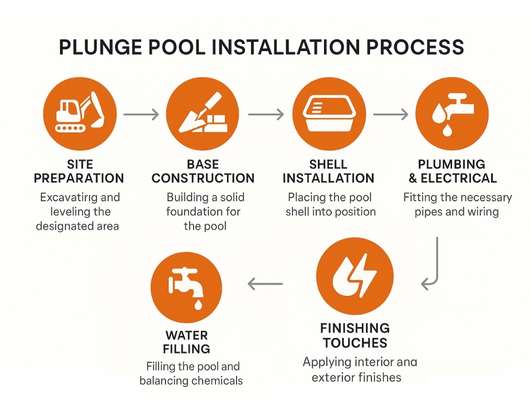
Installing a plunge pool is a meticulous process that requires professional expertise and careful planning to ensure safety, functionality, and aesthetic appeal. Here’s a detailed breakdown of the steps involved in the installation process:
Site Preparation
This is the foundational stage, where the designated area is excavated and leveled to accommodate the plunge pool. The site must meet local building codes and regulations, and the ground should be assessed for stability to prevent future complications.
Base Construction
A robust foundation is essential for the durability of your pool. Typically, this involves pouring a concrete slab or similar structural base to provide a stable platform for the plunge pool.
Pool Shell Installation
Depending on the pool type, this step involves either placing a pre-fabricated plunge pool shell into the prepared site or constructing a custom shell using materials such as concrete or fibreglass. Precise placement is critical to ensure the pool sits level and aligns with surrounding features.
Plumbing and Electrical Works
Skilled professionals then install the necessary plumbing for water circulation, filtration, and drainage, along with electrical systems for pool lighting and pump operation. Proper waterproofing and insulation measures are implemented at this stage to ensure long-term efficiency.
Finishing Touches
Once the structural work is complete, interior finishes, such as tiles or specialised pool coatings, are applied to enhance the pool’s appearance and durability. The coping, decking, and landscaping around the pool are also added to complement your outdoor space.
Water Filling and Chemical Balancing
The final step involves filling the pool with water and balancing its chemistry to ensure it’s safe for use. Testing and adjusting the pH, chlorine, and other levels are crucial to maintaining water quality.
By engaging qualified professionals for your plunge pool installation, you can ensure every stage is executed to the highest standard, resulting in a safe and luxurious addition to your outdoor space.
What to Expect: Your Plunge Pool Journey
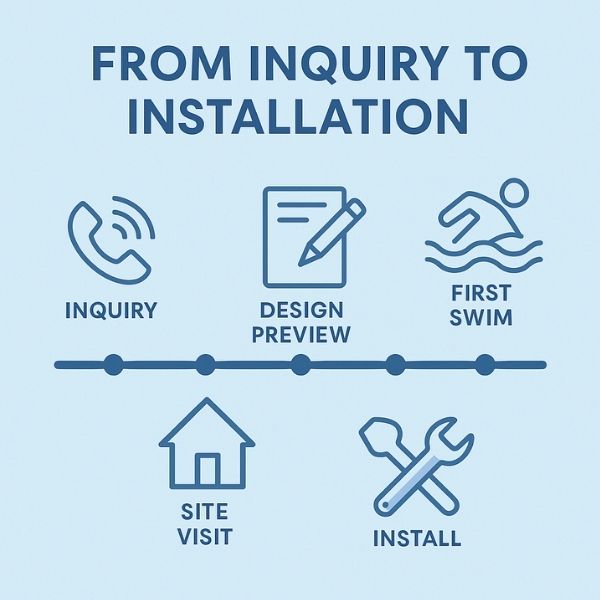
How much do plunge pools cost?
The cost of a plunge pool can vary significantly based on several factors:
- Size and design: Larger or more complex designs will cost more
- Materials used: Concrete, fibreglass, or vinyl liner options have different price points
- Additional features: Heating systems, jet systems, or lighting can increase costs
- Installation complexity: Site accessibility and preparation needs affect labour costs
On average, plunge pool costs in Australia range from $35,000 to $50,000, with some high-end custom designs potentially exceeding this range.
Is a Plunge Pool Right for You?
Consider a plunge pool if:
- Want a low-maintenance water feature.
- You have limited outdoor space.
- Desire a cost-effective alternative to traditional pools.
- Seek health benefits like improved circulation and stress reduction.
Common scenario:
“As a busy professional in Sydney with a small backyard, installing a plunge pool gave me a private retreat to unwind and recharge—without the hassle or footprint of a full-size pool.”
This sentiment is echoed by many of our clients who want a blend of convenience, wellness, and lifestyle enhancement in a compact, efficient design.
Think a plunge pool fits your space and lifestyle?
Get a free design consultation today!
Get My Custom Quote ➔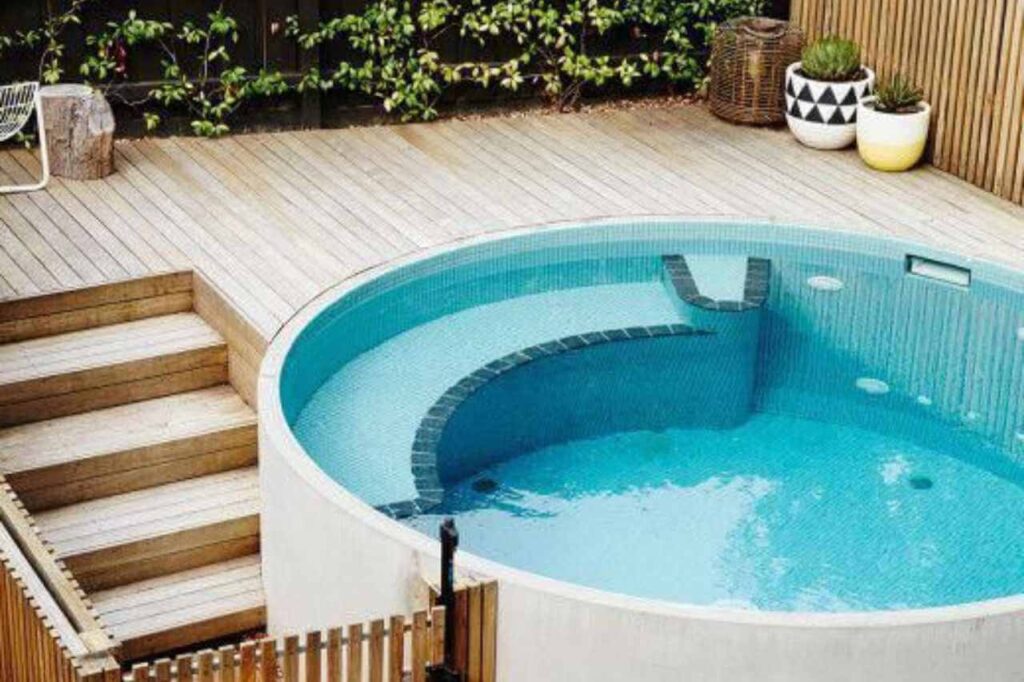
Why Plunge Pools Are a Smart Wellness Investment
Plunge pools offer a harmonious blend of health benefits and aesthetic appeal. Their compact design, coupled with the advantages of cold water immersion, makes them a valuable addition to modern homes. Whether for relaxation, recovery, or wellness, a plunge pool can be a transformative feature in your outdoor space.
Ready to upgrade your health and backyard?
Let’s build your custom plunge pool now.
Build My Wellness Pool Now ➔If you’re wondering which types of plunge pools are easier to install, check our article about Inground vs above ground: Which plunge pools are easier to install.
People Also Ask
How deep are plunge pools typically?
Plunge pools are usually between 1.2 to 2 metres deep, allowing for comfortable standing and light swimming activities.
What are the main health benefits of using a plunge pool?
The main health benefits include stress reduction, improved circulation, muscle relaxation, and potential aid in recovery from exercise or injury.
Can plunge pools be used for exercise?
Yes, plunge pools can be used for light exercises such as water aerobics, resistance training, and gentle swimming. Some models include jet systems for added workout options.
Are plunge pools suitable for small backyards?
Absolutely! Their compact size makes them ideal for small backyards, urban properties, or as part of a larger landscaped outdoor area.
Can plunge pools be heated?
Yes, many plunge pools can be equipped with heating systems, allowing for comfortable use year-round, even in cooler climates.
Are plunge pools environmentally friendly?
Compared to larger pools, plunge pools are generally more environmentally friendly due to their lower water and energy requirements for maintenance and heating.
Are there any risks associated with using plunge pools?
As with any water feature, there are safety considerations. Proper fencing, supervision of children, and maintaining correct water chemistry are important to mitigate risks.

